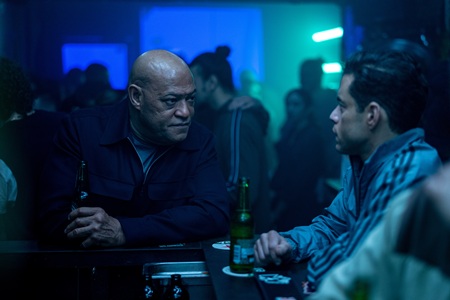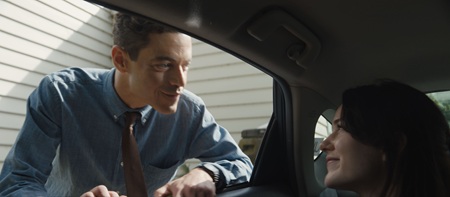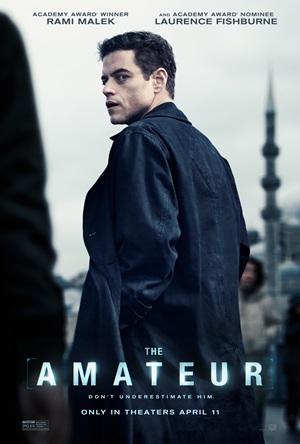
Emotionally Empty Amateur Nothing More than Spy-vs-Spy Nonsense
The most annoying thing about The Amateur is how competent it is. If this sounds like I’m damning the film with faint praise, you’re right. Director James Hawes (One Life) knows what he’s doing and it shows. Even at 123 minutes, he keeps the events moving forward with efficient urgency. Hawes also stages action and suspense sequences with workmanlike clarity, and there’s never any question about what’s going on and why at any time.
While all of this is laudable, none of these facets conceal how unrelentingly derivative of other, far superior tech and espionage thrillers (most of the 1990s or early 2000s variety) everything is. There’s a dash of Jason Bourne here, a dab of the 1995 Sandra Bullock cyberthriller The Net there, and gentle dollops of titles like Spy Game, Ronin, True Lies, and Body of Lies sprinkled throughout for extra seasoning. Finding anything new or original lurking inside the screenplay written by Ken Nolan (Only the Brave) and Gary Spinelli (American Made) — adapted from the novel by Robert Littell — is next to impossible. That makes maintaining interest in the proceedings equally difficult.
The plot is simple enough. After his wife Sarah (Rachel Brosnahan) is murdered in London by four masked gunmen, CIA analyst and cybersecurity wizard Charlie Heller (Rami Malek) blackmails his boss Director Moore (Holt McCallany) to give him covert operative training so he can personally get his revenge. After a brief tutorial from the mysterious Col. Henderson (Laurence Fishburne), and before his superiors can change their mind, Charlie sprints to Europe on his own initiative, intent on dishing out justice without remorse, compassion, or pity.
Malek gets to dive back into his lethal Mr. Robot bag of tricks as the grief-stricken protagonist, and he does give the film a foundational block of internalized gravitas to build upon. But it’s all so frustratingly familiar. Magnetic character actors like Jon Bernthal (a cartoonishly cagey undercover operative who befriends Charlie and is only referred to in hushed tones as “The Bear”) and Julianne Nicholson (an icy, newly installed CIA bigwig who takes instant loathing to her far too cocky subordinate Moore) pop in for a handful of scenes, but they’re only around to interject some peppy life into the proceedings. As for Brosnahan, she as may as well be wearing a neon vest flashing “dead wife walking,” and while the talented actor does what she can, her Sarah nonetheless remains a laughably superficial stereotype.
One actor who does make a massive impression is Michael Stuhlbarg. He shows up near the end as a German supervillain straight out of a James Bond installment. But even though he’s only around for maybe five minutes (if that), Stuhlbarg delivers a performance of multidimensional magnitude. Not only does this character call out Charlie for what he’s done, but he also forces the vengeance-seeking tech genius to take accountability for the blood that’s now staining his hands. It’s a glorious bit of a scene-stealing.
Granted, like large swaths of this endeavor, none of the overarching themes the filmmakers explore end up meaning anything substantive. This is nothing more than a standard popcorn affair where heavy ideas and complex subject matter cannot be allowed to exist for very long. Simple ideas rule the day, and any thoughts that Charlie — assuming he survives — would walk away from all of this absurdity with lasting scars weighing down his conscience are thrown out with not-so-stunning rapidity.
It all does look magnificent, though, and I do think it is clear Hawes eschewed massive action set pieces so he could instead shoot in as many practical locations as possible. This grants cinematographer Martin Ruhe (The American) and production designer Maria Djurkovic (The Imitation Game) the opportunity to create a lived-in, marvelously kinetic visual identity that’s frequently extraordinary. Even better, the director utilizes these environments with pinpoint precision so, if nothing else, and when coupled with the suitably ominous score composed by Volker Bertelmann (Conclave), this thriller is oftentimes a sumptuous sensorial feast.
But those are empty calories. Hawes isn’t cooking up a meal worthy of one Michelin Star, let alone three of them, and for all of his and the talented ensemble’s best efforts, The Amateur is as fresh as a moldy head of lettuce. The emotional throughline to this spy-vs-spy nonsense is dead on arrival, and that’s a trait no film can overcome, no matter how well-crafted and technically competent the overall filmmaking may turn out to be.
Film Rating: 2 (out of 4)








